Can vernacular edtech become mainstream?
With the next half billion students and learners coming from rural India, vernacular edtech is on a steady rise. Can it scale despite challenges?


As an 11th grader, Tarun Saini, a resident of Pounti, a small village close to Ambala, Haryana, had to travel about 30 km every day to get to school. The government school at Pounti only provided subjects for the arts stream, and Saini had to travel by bus for an hour-and-a-half to study at a school that offered science subjects.
Location was only one part of the struggle. “One of my classmates scored 93 percent in her 10th grade. Her parents didn’t allow her to take up science because of the distance and financial struggles," recalls Saini. Hindi-medium government schools in cities like Ambala didn’t have the best infrastructure, leaving students no choice but to go to tuition classes—an additional cost for families struggling to make ends meet.
Saini was one of the lucky few: He got a scholarship and went to study business at Monash University in Australia. Soon after he started working in the education sector there, he realised the gap the Indian education market continued to face in providing quality education in regional languages, catering to ‘Bharat’.
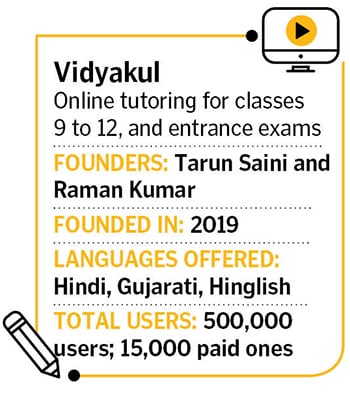 According to experts, the next phase of growth in all industries will be enabled by vernacular. The big customer base is the core middle class, emerging middle-class families in Tier II and III cities, where Hinglish and vernacular languages are spoken. “This demographic, also called the ‘Next Half Billion (NHB)’, consists of nearly 528 million people. The NHB segment is expected to drive the growth of the K12 edtech, creating a $400 million opportunity (out of $1.7 billion)," says Narasimha Jayakumar, managing director, Brainly India, a doubt-solving platform.
According to experts, the next phase of growth in all industries will be enabled by vernacular. The big customer base is the core middle class, emerging middle-class families in Tier II and III cities, where Hinglish and vernacular languages are spoken. “This demographic, also called the ‘Next Half Billion (NHB)’, consists of nearly 528 million people. The NHB segment is expected to drive the growth of the K12 edtech, creating a $400 million opportunity (out of $1.7 billion)," says Narasimha Jayakumar, managing director, Brainly India, a doubt-solving platform.
As per Nielsen’s Bharat 2.0 Study, there has been a 45 percent growth in active internet users since 2019. Rural India has 352 million internet users, of which almost 60 percent are not actively using the internet. The room for growth is massive. Within the edtech space, deeper penetration within the vernacular languages is key. “Vernacular offerings work well in bridging the divide between ‘India’ and ‘Bharat’, creating a massive opportunity for startups addressing this target audience," says Ashwin Raguraman, co-founder and partner at Bharat Innovation Fund, which has also invested in vernacular edtech startup Pariksha.
 Narasimha Jayakumar of Brainly India claims the platform has over 48 million answers, available for free
Narasimha Jayakumar of Brainly India claims the platform has over 48 million answers, available for free
In 2019, Saini, along with co-founder Raman Garg, launched Vidyakul. However, it was a different business model—a marketplace, where anyone can upload their content. “We realised that if you’re into academics, you need to take responsibility and provide students with end-to-end solutions. So, in 2021, we totally pivoted," says Saini.
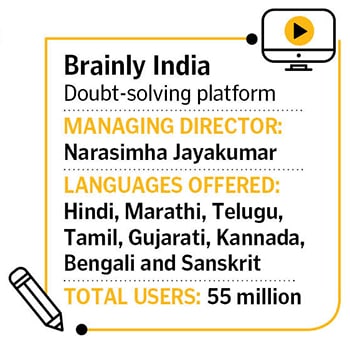
Currently, the Gurugram-based startup is making education more accessible for state board students from classes 9 to 12 in Uttar Pradesh, Bihar and Gujarat. They provide students with live classes, notes, sample papers, e-books, mock tests and mentoring. Each of these courses is provided at an affordable price of ₹250-300 per month per subject. “Our teams have travelled all over Uttar Pradesh, Bihar and Gujarat. We saw that most schools barely have teachers, and none of them has labs, so we started providing students with lab experiments in our live classes," he says.
In order to reach more students, Saini and his team have hired local teachers, who sit out of studios in their respective locations. For instance, they have teachers from Patna, who teach students in Bhojpuri, not Hindi. Says Saini, “If you want to touch Bharat, you have to touch their local language." The audience Vidyakul reaches is unmapped, and a majority of them are first-time internet and device users. The platform has close to 500,000 registered and 15,000 paying users. It raised a seed round of $800,000 last year.
Vidyakul hopes to continue focusing on 9th to 12th graders, and not as much on test prep. Reason? “Our segment is 80 percent of kids in India that either belong to Tier IV cities and rural India, or kids who live in metros but belong to underprivileged families. Their focus is not on getting into IITs, but to get good grades in their 12th standard exams and get a good job," says Saini.
Another company looking at school education across regional languages is global edtech player Brainly. The company launched its India operations in 2013. The doubt-solving platform is used by 55 million pupils, parents and instructors, and has a knowledge base of over 48 million answers in India, available for free in Hindi, Marathi, Telugu, Tamil, Gujarati, Kannada, Bengali, and Sanskrit.
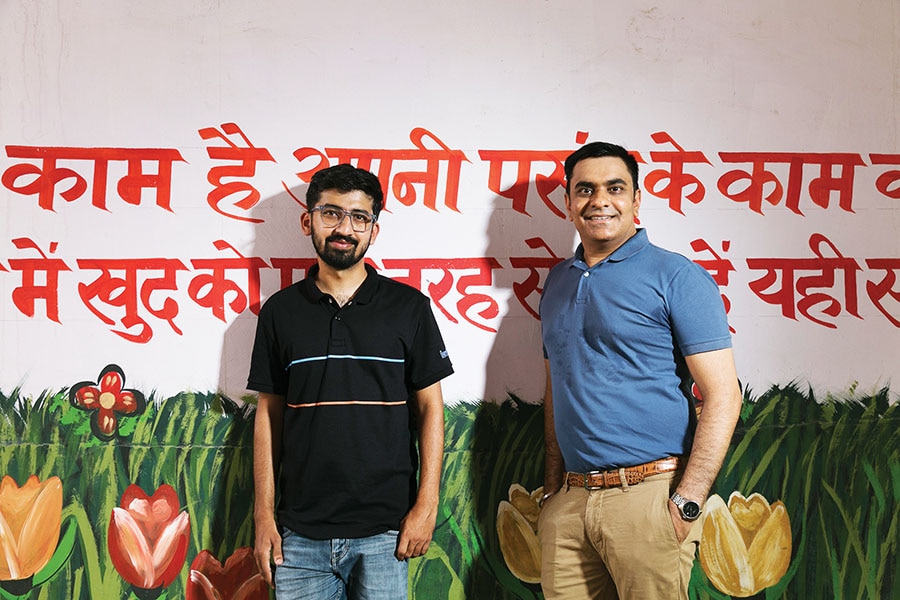 Karanvir Singh (right) and Utkarsh Bagri, co-founders of Pariksha, a vernacular test preparation platform for government job examsImage: Madhu Kapparath
Karanvir Singh (right) and Utkarsh Bagri, co-founders of Pariksha, a vernacular test preparation platform for government job examsImage: Madhu Kapparath
“The platform operates on a ‘freemium’ business model, with hundreds of state board and NCERT books, textbooks, exam preparation content, video-based lessons and other resources available for free. We are also working on introducing tutoring features," says Jayakumar. “In India, during the last two years, the learning gap has widened. Students relied on neighbourhood tuitions and teachers pre-pandemic however, the outbreak disrupted this, driving children to seek other sources of education. Our platform narrows this gap, with an aim to clear the foundational concepts for students."
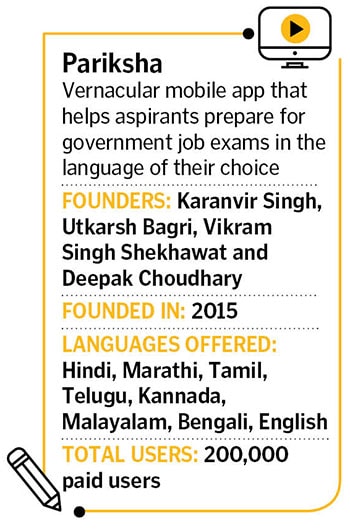 While Vidyakul and Brainly focus on online tutoring of school students, Pune-based Pariksha focuses on test preparation for government job exams. In 2018, while attending a wedding at Satna in Madhya Pradesh, Utkarsh Bagri was only hearing chatter around the ‘Patwari Exam’, a state government test to recruit someone to maintain land ownership records as well as keeping a record of land tax collection. “The craze seemed to be as big as the IIT-JEEs. I found that there were 11 lakh applicants for 9,000 seats, it was the same ratio as IIT-JEE," recalls Bagri, co-founder at Pariksha.
While Vidyakul and Brainly focus on online tutoring of school students, Pune-based Pariksha focuses on test preparation for government job exams. In 2018, while attending a wedding at Satna in Madhya Pradesh, Utkarsh Bagri was only hearing chatter around the ‘Patwari Exam’, a state government test to recruit someone to maintain land ownership records as well as keeping a record of land tax collection. “The craze seemed to be as big as the IIT-JEEs. I found that there were 11 lakh applicants for 9,000 seats, it was the same ratio as IIT-JEE," recalls Bagri, co-founder at Pariksha.
He realised that most applicants came from Tier III and IV cities and took the exam in Hindi. Till then, Pariksha—founded in 2015—was a placement preparation platform. “We found that, in India, there are close to 7.5 crore applicants who take government job exams every year. Finding an opportunity here, we moved into vernacular state government exam prep," says Bagri. After a successful pilot in Madhya Pradesh, they have now expanded to 16 states and eight languages.
In order to cater to the remotest parts, gaining trust and credibility were key. “As a way to solve this, we identified the most successful education institutes at a state level and partnered with them, providing a co-branded offering to the user. For instance, in Maharashtra, Pune-based Chanakya Mandal is a household name. However, only 10 percent of students can travel to Pune to study here," says Karanvir Singh, co-founder, Pariksha.
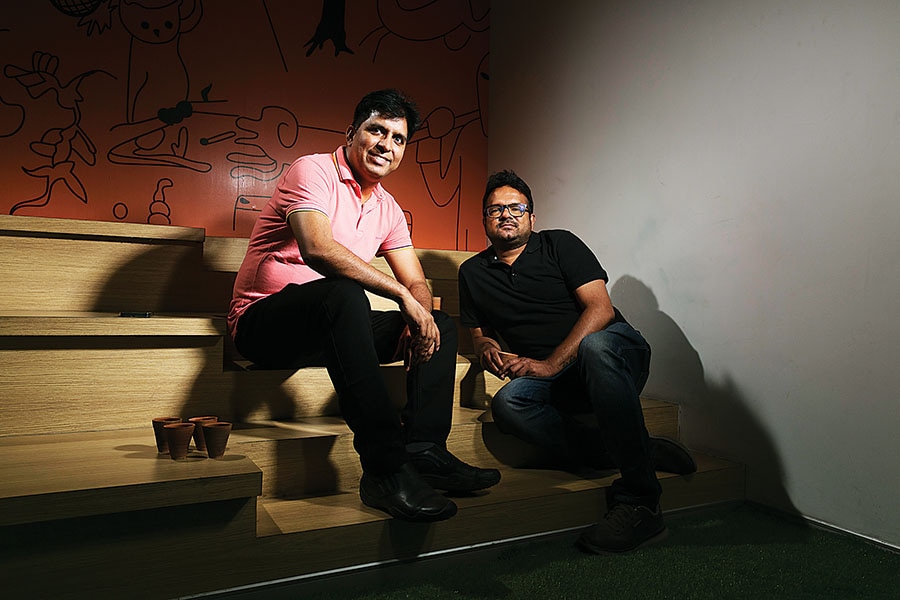 Anil Nagar (left) and Saurabh Bansal, co-founders, Adda247. It provides test prep courses for government jobs in multiple languagesImage: Madhu Kapparath
Anil Nagar (left) and Saurabh Bansal, co-founders, Adda247. It provides test prep courses for government jobs in multiple languagesImage: Madhu Kapparath
The startup is hoping to solve two main issues—affordability and accessibility. The tuition fee for a course at Chanakya Mandal would cost an average of ₹1 lakh add to that the additional cost of living in Pune. Whereas, the course on Pariksha costs ₹25,000. Singh adds, “The partnership is a win-win situation for us... we give them access to a larger market and they share the content and teaching pedagogy. It is a revenue-sharing model." With this capital-efficient business model, the company has ratchetted up 200,000 paying users and a turnover of ₹4 crore last year.
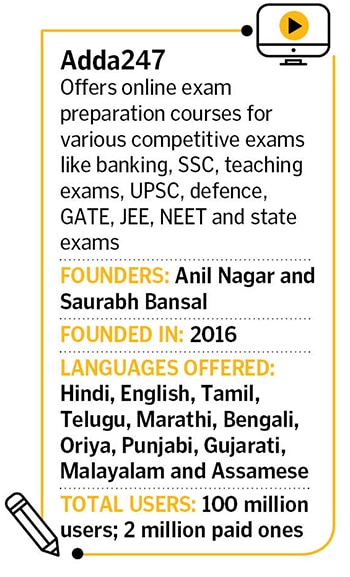 Similarly, Entri pivoted from a B2B model—providing a SaaS platform to coaching institutes across Kerala—to a learning application for job skills in India. Engineering graduates Mohammed Hisamuddin and Rahul Ramesh built a dashboard for teachers in these institutes, so that they could improve the learning experience inside the classroom. “We ran it for two-and-a-half years. There were 1,000 students and 150 students using the platform, but we realised it was hard to scale it beyond that," recalls Hisamuddin.
Similarly, Entri pivoted from a B2B model—providing a SaaS platform to coaching institutes across Kerala—to a learning application for job skills in India. Engineering graduates Mohammed Hisamuddin and Rahul Ramesh built a dashboard for teachers in these institutes, so that they could improve the learning experience inside the classroom. “We ran it for two-and-a-half years. There were 1,000 students and 150 students using the platform, but we realised it was hard to scale it beyond that," recalls Hisamuddin.
While running the SaaS platform, he visited close to 150-200 coaching institutes across Kerala, Karnataka and Tamil Nadu. “I saw that if there was one institute for engineering and medical exams, there were 100x more for local language government job exams, upskilling courses for spoken English etc. I realised this market was much bigger," adds Hisamuddin.
As a pilot, the team launched a set of mock tests for the lower division clerk exams. The number of students started growing gradually from one to two a day to 100, 500 and 1,000 students a day. Entri started with Malayalam, but it has now expanded to Hindi, Tamil, Telugu and Kannada.
While catering to this segment, the Entri team realised that due to the limited seats in government jobs, not everyone who appears for the exam gets a job. “A majority would then apply for private jobs within or outside India. We expanded to include upskilling courses for spoken English, digital marketing and sales," explains Hisamuddin.
The platform has received $11 million in funding, has 95 lakh registered users, of which 350,000 are paying users. The target is to reach 4 crore users in two-and-a-half to three years. From FY20, their revenue has grown 10x in FY22.
Unlike Pariksha and Vidyakul, Anil Nagar of Adda247 had first established a venture in the offline education space called ‘Career Power’. The coaching centre for test preparation—launched in 2010—had close to 100 centres across cities. However, in 2016, Nagar and co-founder Saurabh Bansal pivoted their business model to online for the sole reason of reaching out to masses and to cater to the learning needs of students from Tier II, III cities and villages. “The only way we could reach that segment was online," says Nagar. In 2016, the founders set up Adda247, providing test prep courses for government jobs in Tamil, Telugu, Marathi and Bengali, and added others over the years taking their tally to over 10 languages. “Till 2019, we had central-level job exam test prep courses, but in 2020, we also expanded to state-level jobs," he says.
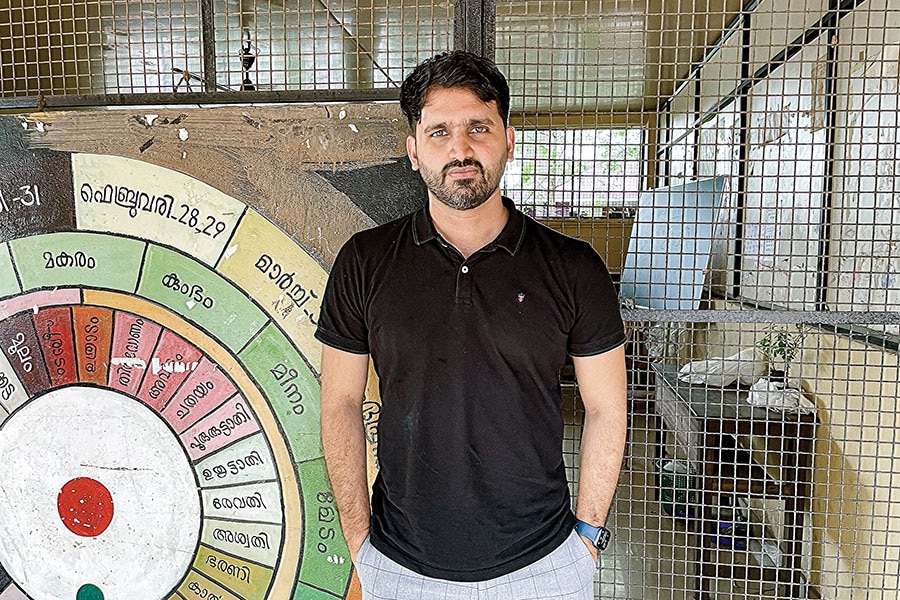 Mohammed Hisamuddin says Entri started with Malayalam, but has now expanded to Hindi, Tamil, Telugu and Kannada
Mohammed Hisamuddin says Entri started with Malayalam, but has now expanded to Hindi, Tamil, Telugu and Kannada
The company has 15 state-wise verticals and over 100 million users, of which two million are paying. With about 10-12 languages being offered, it is growing approximately 100 percent year-on-year in terms of revenue. With its team of 1,000-odd people, all its content is being created in-house. In total, they’ve raised $20 million from investors, including Westbridge Capital, Info Edge and Asha Impact. Adda247 also wishes to focus on private jobs. “Usually the seats for government jobs are very limited, and many stay jobless. We want to help them as well," says Nagar.
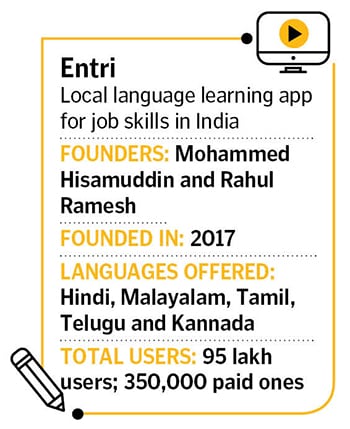 While the next half billion is expected to come from Tier III, IV cities and rural India, it comes with its own set of challenges like internet connectivity and accessibility. As a means to solve this, the edtech players provide users with an option to download videos for offline viewing later. Vidyakul’s tech team claims to allow users to download hour-long classes on 3G as well. In certain areas, where electricity is an problem, Entri has introduced a feature where a user can put the phone to sleep and still listen to the voice from the video, enabling them to save battery.
While the next half billion is expected to come from Tier III, IV cities and rural India, it comes with its own set of challenges like internet connectivity and accessibility. As a means to solve this, the edtech players provide users with an option to download videos for offline viewing later. Vidyakul’s tech team claims to allow users to download hour-long classes on 3G as well. In certain areas, where electricity is an problem, Entri has introduced a feature where a user can put the phone to sleep and still listen to the voice from the video, enabling them to save battery.
Another issue Singh of Pariksha points out is that of gender divide, “Often parents aren’t willing to send their daughters to metros and Tier II cities to study and neither do they want to spend too much on their education. Platforms like ours are ensuring this gender gap reduces."
The biggest challenge apart from bandwidth, says Hisamuddin, is, “building a brand for each state you are present in. You cannot treat the country as one market, each state is a different market".
With each of these players growing fast, and capturing a big chunk of the rural market, are they next in line to be acquired? “Vernacular market is on everyone’s radar right now," says Singh of Pariksha. Most platforms claim to have received offers from larger companies. None of them is keen, but it gives them confidence that they are on the right path.
Gokul Rajaram, product and business helper at Doordash, and board member at Pinterest and Coinbase, is an angel investor in Entri. He says, “Two simple stats show why vernacular edtech is a big opportunity: Ninety percent of India does not speak English and there are 55-plus languages in India with 1 million speakers each. It’s a greenfield opportunity for companies to offer a truly mass market edtech service “
According to Saini of Vidyakul, vernacular edtech is the need of the hour. He claims that, in India, 70 percent of students go to state board schools. “Class 10 CBSE students across India amount to 25 lakh, while in Uttar Pradesh alone, there are 36 lakh Hindi-medium students in class 10. In metros, edtech platforms are the second or third option but in Tier III, IV cities, they are often the only option," says Saini.
First Published: Jun 29, 2022, 11:58
Subscribe Now